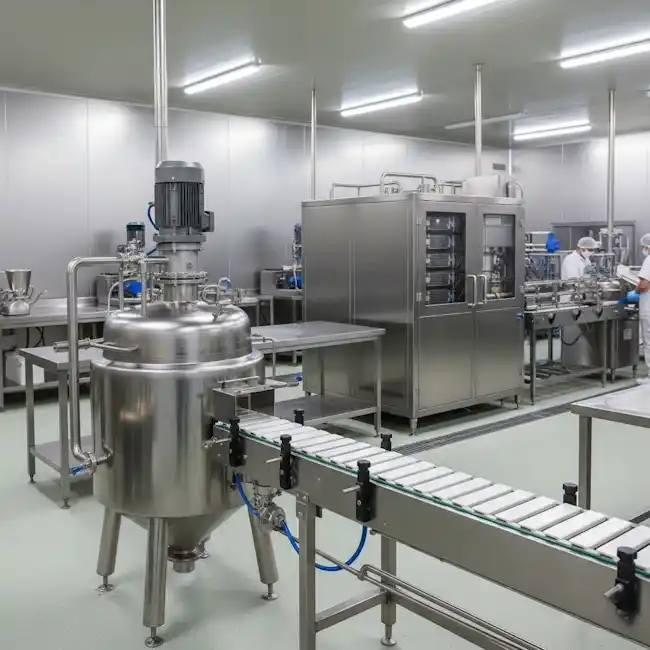The choice of materials in the food, pharmaceutical, and chemical industries is not just a technical requirement, but a critically important decision that affects the quality, safety, and reputation of the product. In this context, stainless steel is an indispensable material. It guarantees hygiene, durability, and compliance with the most stringent international standards.
This article will explain why the right choice of stainless steel is an investment in consumer safety and the success of your business.
1. Key requirements for materials in the food industry
Any equipment that comes into contact with food products must meet several key criteria:
- Hygiene: the surface of the material must be smooth, non-porous, and easy to clean and disinfect. This prevents the proliferation of bacteria, fungi, and other microorganisms that can harm the product.
- Corrosion resistance: aggressive environments-acids, alkalis, salts, and sanitizing solutions—are often used in production. The material must withstand their effects without degradation.
- Chemical inertness: the material should not react with the product, or alter its taste, color, smell, or chemical composition. It must be neutral to everything it contacts.
- Mechanical strength: the equipment must withstand significant loads, pressure, and temperature fluctuations without deforming.
Stainless steel, especially popular grades, fully meets these requirements, making it the ideal choice.
2. Key grades of stainless steel for production
Not all stainless steel is the same. For the food industry, austenitic grades with a high chromium and nickel content are most commonly used.
- AISI 304: "The Standard for the Food Industry". This is the most popular grade. It contains 18% chromium and 8% nickel, providing excellent corrosion resistance in most environments. It is ideal for:
- Containers for storing liquids (milk, beer, juices).
- Work surfaces, tables, and kitchen equipment.
- Pipelines and fittings for transporting neutral products.
- AISI 316: "The Choice for Aggressive Environments". This grade is more expensive but is indispensable where AISI 304 may not be sufficiently resistant. The key difference is the addition of molybdenum (2-3%). Molybdenum significantly increases corrosion resistance, especially in chlorinated and acidic environments. AISI 316 is used for:
- Equipment for the production of sauces, vinegar, and ketchup.
- Containers for storing salt solutions and marinades.
- Equipment used in marine environments or for water purification.
3. Examples of stainless steel use in equipment
Stainless steel is the basis for many types of industrial equipment:
- Tanks and vessels: for storing, mixing, and transporting liquid and bulk products.
- Pipelines and fittings: for creating hygienic liquid delivery systems without the risk of contamination.
- Conveyor belts: for the automated movement of products at various stages of production.
- Kitchen furniture and equipment: tables, hoods, racks, and sinks.
4. Consequences of cutting corners on quality
Using cheap alternatives (such as regular steel with a coating) may seem like an attractive solution, but it carries significant risks:
- Corrosion: surface damage can lead to the release of rust, which will contaminate the product and make it unfit for consumption.
- Reduced service life: such equipment fails faster, requiring frequent repairs or complete replacement.
- Risk to consumer health: contamination of the product due to low-quality material can have serious health consequences, leading to lawsuits and loss of trust.
Reputational damage: scandals related to low-quality products can destroy a brand's reputation, the recovery of which will take years.
5. Conclusion: your business depends on reliability
Choosing a reliable supplier of stainless steel is not an expense, but an investment in the long-term success, safety, and reputation of your enterprise. High-quality metal products guarantee compliance with sanitary standards, ensure uninterrupted operation, and protect against potential risks.
If you are looking for a reliable partner for your production, we are ready to offer professional consultation and select the stainless steel that will meet all the specific requirements of your project.
